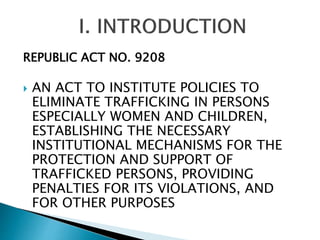Reference




OpenAI's Answer
Republic Act No. 9208, known as the "Anti-Trafficking in Persons Act of 2003," provides various protections for trafficking victims, particularly focusing on women and children. Here are the key aspects of how the act protects victims:
-
Protection and Support: The act establishes institutional mechanisms to support and protect trafficked victims. This includes providing shelters, counseling, and rehabilitation services.
-
Witness Protection Program: Victims are eligible for a witness protection program to ensure their safety and encourage them to testify against traffickers.
-
Victim Compensation Program: The law includes provisions for compensating victims for damages suffered due to trafficking.
-
Legal Rights: Trafficked individuals are given the right to initiate complaints against offenders, providing a legal avenue for redress and justice.
-
Severe Penalties: The act imposes heavy penalties on those found guilty of human trafficking, aiming to deter such activities.
-
Awareness and Training: The act mandates the government to conduct awareness campaigns and training programs for law enforcement personnel and other stakeholders to effectively combat trafficking.
For more details, you can read about the act here.